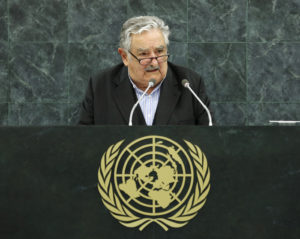
Jose Mujica
José Alberto “Pepe” Mujica Cordano served as the 40th President of Uruguay from 2010 to 2015. In the 1960s, he was a guerrilla with the Tupamaros movement, an armed political group inspired by the Cuban Revolution. During the military dictatorship in Uruguay during the 1970s and 1980s, he was imprisoned for 12 years. As the candidate of the Broad Front coalition of left-wing parties, he won the 2009 presidential election and took office as President on 1 March 2010. As President, he legalized the sale of marijuana, passed same-sex marriage law, and made abortion legal.
By regulating Uruguay’s $40 million-a-year marijuana business, the government took it away from drug traffickers and weakened the drug cartels. The government also kept track of all marijuana consumers in the country and provided treatment to the most serious abusers, treating them on par with alcoholics.
Jose Mujica declined to live in the presidential palace or to use its staff. He lived very simply on a farm outside the capital Montevideo. He donated 90% of his salary to charities that helped poor people and small entrepreneurs. He has been called “the world’s poorest head of state”.
In 2012, at the Rio+20 Summit in Brazil, Jose Mujica gave an address on “Human happiness and the environment”. Here are some parts of this famous speech:
“We have been talking about sustainable development, about rescuing the masses from the claws of poverty. What is it that flutters within our minds? Is it the model of development and consumption, which is shaped after that of affluent societies?
I ask this question: what would happen to this planet if the people of India had the same number of cars per family as the Germans? How much oxygen would there be left for us to breathe? More clearly: Does the world today have the material elements to enable 7 or 8 billion people to enjoy the same level of consumption and squandering as the most affluent Western societies? Will that ever be possible? Or will we have to start a different type of discussion one day? Because we have created this civilization in which we live: the progeny of the market, of the competition, which has begotten prodigious and explosive material progress. But the market economy has created market societies. And it has given us this globalization, which means being aware of the whole planet.
Are we ruling over globalization or is globalization ruling over us? Is it possible to speak of solidarity and of “being all together” in an economy based on ruthless competition? How far does our fraternity go?
Today, man does not govern the forces he has unleashed, but rather, it is these forces that govern man; and life. Because we do not come into this planet simply to develop, just like that, indiscriminately. We come into this planet to be happy. Because life is short and it slips away from us. And no material belonging is worth as much as life, and this is fundamental. But life is going to slip through my fingers, working and over-working in order to be able to consume more, and the consumer society is the engine – because ultimately, if consumption is paralyzed, the economy stops, and if you stop economy, the ghost of stagnation appears for each one of us, but it is this hyper-consumption that is harming the planet. And this hyper-consumption needs to be generated, making things that have a short useful life,
Development cannot go against happiness. It has to work in favor of human happiness, of love on Earth, human relationships, caring for children, having friends, having our basic needs covered. Precisely because this is the most precious treasure we have; happiness. When we fight for the environment, we must remember that the essential element of the environment is called human happiness.”
